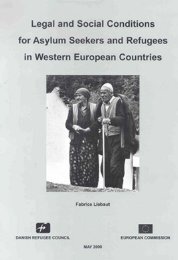Bulgaria - The social impact of seasonal migration
Bulgaria - The social impact of seasonal migration
Bulgaria - The social impact of seasonal migration
Create successful ePaper yourself
Turn your PDF publications into a flip-book with our unique Google optimized e-Paper software.
52<br />
Another <strong>impact</strong> <strong>of</strong> the increased <strong>seasonal</strong> <strong>migration</strong> is the attempt <strong>of</strong> local authorities to<br />
participate more actively in mediating work abroad. <strong>The</strong> municipality <strong>of</strong> Vidin had<br />
decided to establish a regular bus line between Vidin and Italy, to serve the needs <strong>of</strong> the<br />
local migrants. In another example, the mayor <strong>of</strong> Kirkovo had organised meetings <strong>of</strong><br />
Greek employers and local candidate-workers which took place in the building <strong>of</strong> the<br />
municipality. By constituting themselves as brokers <strong>of</strong> temporary work abroad,<br />
representatives <strong>of</strong> the local authorities hoped to spare the would-be migrants the huge<br />
taxes <strong>of</strong> private consulting firms (in the range <strong>of</strong> 800 USD per exit) as well as to regulate<br />
<strong>migration</strong> flows. <strong>The</strong>ir endeavours had remained so far unsuccessful, since even the<br />
engagement <strong>of</strong> local power could not force foreign employers to <strong>of</strong>fer legal work<br />
contracts to their <strong>Bulgaria</strong>n employees.<br />
4.1.3. Negative <strong>impact</strong> <strong>of</strong> e<strong>migration</strong> – brain drain, depopulation, a negative image<br />
As a result <strong>of</strong> out-<strong>migration</strong>, <strong>Bulgaria</strong> had lost large segments <strong>of</strong> highly qualified<br />
specialists and workers as well. <strong>The</strong> intensive e<strong>migration</strong> <strong>of</strong> highly qualified personnel<br />
has continued since 1990. Of the total emigrants in 1991, some 12% held university<br />
degrees and 18% had graduated from college (Bobeva 1994, 230). In 1992, the Institute <strong>of</strong><br />
Demography conducted an investigation on the losses <strong>of</strong> scholars from the <strong>Bulgaria</strong>n<br />
Academy <strong>of</strong> Sciences as a consequence <strong>of</strong> the economic crisis and the lack <strong>of</strong> adequate<br />
resources for scientific research in the transition period (Tsekova 1993). It demonstrated<br />
that in 1990-2, 440 <strong>of</strong> the scholars working in the <strong>Bulgaria</strong>n Academy <strong>of</strong> Sciences had left<br />
the country; this number constituted nearly 6% <strong>of</strong> all scholars in the Academy. <strong>The</strong><br />
worst to be hit by brain drain were the sciences with established traditions <strong>of</strong><br />
international co-operation, namely biology (144 people), mathematics (71), the<br />
technical sciences (47) and physics. <strong>The</strong> most preferred destination country was<br />
definitely the USA, having attracted around 1/3 <strong>of</strong> all emigrant scholars, followed by<br />
Germany, France, Canada, and the UK.<br />
Brain drain affected particularly negatively the community <strong>of</strong> the <strong>Bulgaria</strong>n Turks,<br />
which lost 9 000 university graduates during the early 1990s, according to Turkish<br />
statistics (Bobeva 1994, 227). <strong>The</strong> deficit <strong>of</strong> economists, teachers and engineers in the<br />
ethnically mixed regions <strong>of</strong> <strong>Bulgaria</strong> becomes an additional predicament to the<br />
economic development <strong>of</strong> these stagnating regions. Recent e<strong>migration</strong>s from these<br />
areas kept involving the most active and qualified part <strong>of</strong> the population, those who had<br />
lost their privileged <strong>social</strong> status amidst political and economic transformations. Among<br />
them are former mayors and representatives <strong>of</strong> municipal councils, former policemen,<br />
technicians, students and doctors (interviews No. 25 and No. 26).<br />
One <strong>of</strong> the negative <strong>impact</strong>s <strong>of</strong> e<strong>migration</strong> is the depopulation <strong>of</strong> some areas in <strong>Bulgaria</strong>,<br />
especially in the ethnically mixed regions where e<strong>migration</strong> took massive proportions.<br />
Some villages, towns, cities and municipalities have almost halved their population for<br />
the last decade or so. <strong>The</strong> scale <strong>of</strong> this phenomenon is evident from the table below,<br />
showing the population movement in Kirkovo municipality in South-eastern <strong>Bulgaria</strong>.<br />
Although the difference between the two columns gives the number <strong>of</strong> those residing<br />
elsewhere (both in and out <strong>of</strong> <strong>Bulgaria</strong>), it is used by local population statistics experts<br />
and the administration as a figure showing the approximate size <strong>of</strong> external <strong>migration</strong>.

















